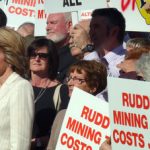First. At little bit of history.
The idea of a Minerals Resources Rent Tax, (MRRT), was introduced by Kevin Rudd and became law in 2012.It was a sensible solution to a genuine problem, yet it was electorally very unpopular, was – not surprisingly – vigorously opposed by the mining industry, and was eventually dumped by the Coalition in government.Today, you’d struggle to find anyone who thinks it was a bad idea, outside of the Mining Industry, and even they’d admit it, if they were honest.
So, what was the problem back then?
During boom conditions, mining companies were making vast profits from extracting irreplaceable national resources, while the great majority of Australians were missing out on any  benefits. Much of the profits went overseas, so it was a double whammy for Aussies.
benefits. Much of the profits went overseas, so it was a double whammy for Aussies.
You’d think it’d be a no brainer.
So, why did it fail?
I would argue, it failed because Rudd told the electorate there was a problem and offered a solution in the same breath.
This enabled the mining industry and their Coalition lackies to ignore the problem and to campaign on what was wrong with the solution; that jobs would be lost. A complete lie of course, but an effective one.
So, what could Rudd have done differently?
Well, he could have spent six months telling the electorate how it was being robbed by foreigners and corporations. This would’ve forced the companies and the then Opposition LNP either to try to defend the indefensible, or to shut the hell up.
And you know they wouldn’t do that.
Once the electorate was suitable incensed, Rudd could’ve then offered the MRRT as a solution.
He’d have won a major victory and been hailed a hero.
So, what does this tell us about Labor’s recent loss?
Simply this.
Labor made exactly the same mistake Rudd did, but on many fronts. Shorten offered multiple problems and solutions almost in the same breath. This enabled Morrison, along with the various vested interests, to skip right over the very real problems, and either attack Labor’s solutions or present them as draconian and unnecessary.
And again, an electorate that wasn’t given time to understand and accept the NEED for change, was led to be terrified of the solutions.
Morrison never offered solutions of his own. He simply pretended the problems didn’t exist and daily attacked the solutions as having either much worse side effects that they actually did, or claimed they weren’t even necessary.
Just like it did with the MRRT, the strategy succeeded, beyond his wildest dreams.
So, in the unlikely event of any Labor strategists reading this, I implore you to learn this simple political lesson: Never, ever, offer a solution until the electorate is thoroughly convinced that the problem is genuine and that it’s being hurt by it.
In fact, here’s a simple action plan:
1. Get into power by any means you can;
2. Spend the first six months educating the electorate about the genuine problems you’ve inherited. Really spell them out, over and over again;
3. When and only when you’re certain the electorate is convinced that the problems are real and MUST be fixed, do you offer solutions;
4. Implement the solutions through the rest of the term;
5. Go to the next election with a track record of getting really good things done.
It’s not that hard, people, especially when the Coalition mostly can’t even acknowledge that the problems exist, because that would be contrary to their profoundly flawed ideology of Neoliberalsim.
But above all, do not make the same mistake a third time.
Australia can’t afford it.




